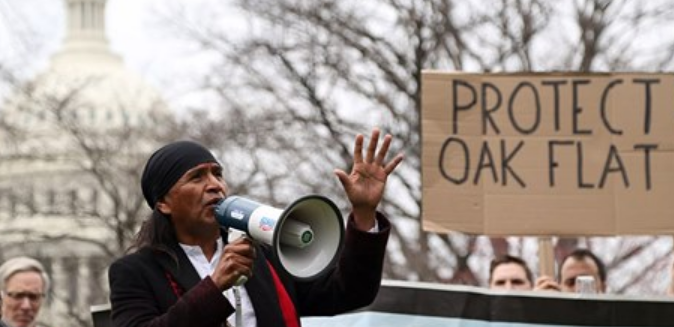
- Details
- By Darren Thompson
SAN FRANSISCO— The federal government has temporarily halted plans to construct a copper mine on sacred Indigenous land in Arizona known as Oak Flat, citing an error in oral arguments made at a March hearing.
The U.S. Department of Justice (DOJ) official filed a letter to the 9th Circuit Court of Appeals on Thursday, May 18, saying it made an error during oral arguments on March 21 when the 9th Circuit reheard Apache Stronghold v. United States, a case that encapsulates a nearly decade-long fight to save the land sacred to the San Carlos Apache Tribe.
The letter states that the government was mistaken about when the U.S. Forest Service would issue the Environmental Impact Statement (EIS), which would finalize a land exchange between the U.S. Forest Service and Resolution Copper, kickng off construction of the mine. In oral arguments at the en banc hearing, attorneys representing the U.S. Forest Service stated the EIS will be finalized this spring or early summer. However, a timeframe for the final EIS has not yet been determined.
“Government counsel informed the Court that the ‘the prediction still is that [the EIS] will be ready this spring’ and would be issued by late spring or early summer,” Joan M. Pepin wrote to the U.S. Court of Appeals for the Ninth Circuit on Thursday, May 18. “The Department has not yet identified a timeframe for completing its review.”
The federal government said it is currently conducting a thorough review of its consultation records, including environmental and associated documents to ensure compliance of a 2,422 acres land swap on federal land above a copper deposit. The area is considered sacred by many Apache people.
“The Government told the Court tonight that it is delaying its timeline for issuing its Environmental Impact Statement on Oak Flat,” said Dr. Wendsler Nosie, Sr. of Apache Stronghold in a statement. “It is illegal, immoral, and wrong for the government to take away our sacred land and give it to a foreign-owned mining corporation for destruction. We await the Court’s decision and thank our thousands of supporters for continuing to pray and speak out for the protection of Oak Flat.”
Last month, the San Carlos Apache Tribe took its fight to the United Nations, saying the approval of the land deal is a human rights violation. The mine sits on top of a ceremonial ground the Apache call Chí’chil Biłdagoteel, or “Oak Flat,” in Arizona’s Tonto National Forest. The mine is estimated at $64 billion, with 1.787 billion metric tonnes of copper with an average grade of 1.5% copper over the next 60 years. The company says the mine’s life will provide thousands of direct and indirect jobs and will supply nearly 25% of the domestic demand for copper.
San Carlos Apache Chairman told Native News Online last month that the Tribe wants the EIS to be redone. Leaders say that the U.s. Forest Service published the project’s final environmental impact statement (FEIS) on January 15, 2021, during the final days of the Trump Administration. However, President Biden halted the FEIS on March 1, 2021, saying the project needed more time to consult with Indian Tribes.
The U.S. Forest Service is court-ordered to issue a notice at least 60 days before issuing its EIS.
More Stories Like This
Trump signs law that revokes some limits on drilling in Alaska’s National Petroleum ReserveSouthern Sierra Miwuk Nation Gets 900-Acres ofLand Back
Chilkat Indian Village Tells New Palmer Mine Owners They Are “Not Welcome” in Chilkat Valley
Tribes, Coastal Group Ask Army Corps to Revoke Permit for Texas Export Terminal
Michigan Tribes Tell Supreme Court: Don’t Bail Out Enbridge
Help us defend tribal sovereignty.
At Native News Online, our mission is rooted in telling the stories that strengthen sovereignty and uplift Indigenous voices — not just at year’s end, but every single day.
Because of your generosity last year, we were able to keep our reporters on the ground in tribal communities, at national gatherings and in the halls of Congress — covering the issues that matter most to Indian Country: sovereignty, culture, education, health and economic opportunity.
That support sustained us through a tough year in 2025. Now, as we look to the year ahead, we need your help right now to ensure warrior journalism remains strong — reporting that defends tribal sovereignty, amplifies Native truth, and holds power accountable.
 The stakes couldn't be higher. Your support keeps Native voices heard, Native stories told and Native sovereignty defended.
The stakes couldn't be higher. Your support keeps Native voices heard, Native stories told and Native sovereignty defended.
Stand with Warrior Journalism today.
Levi Rickert (Potawatomi), Editor & Publisher

